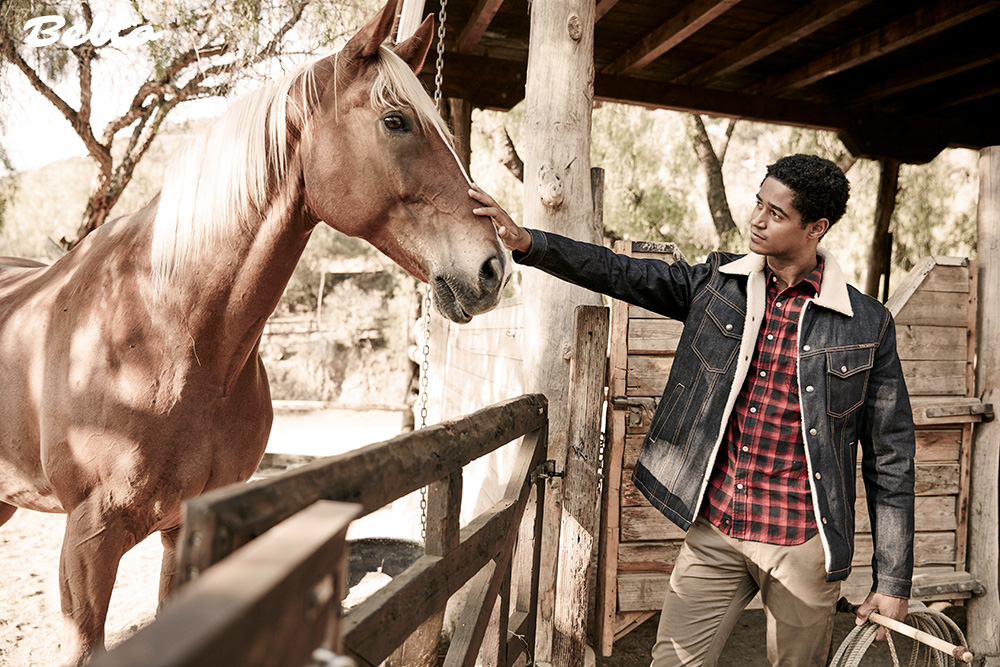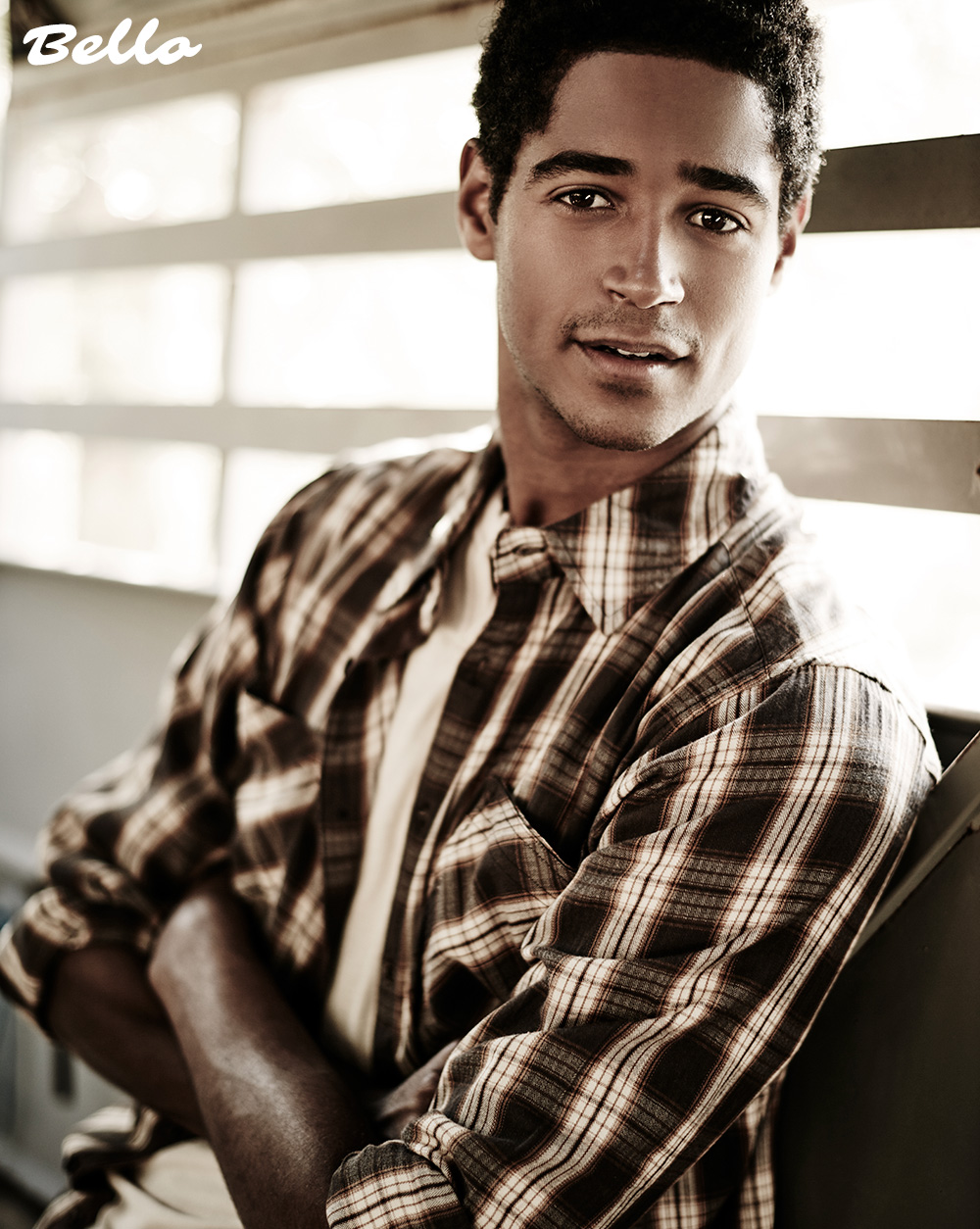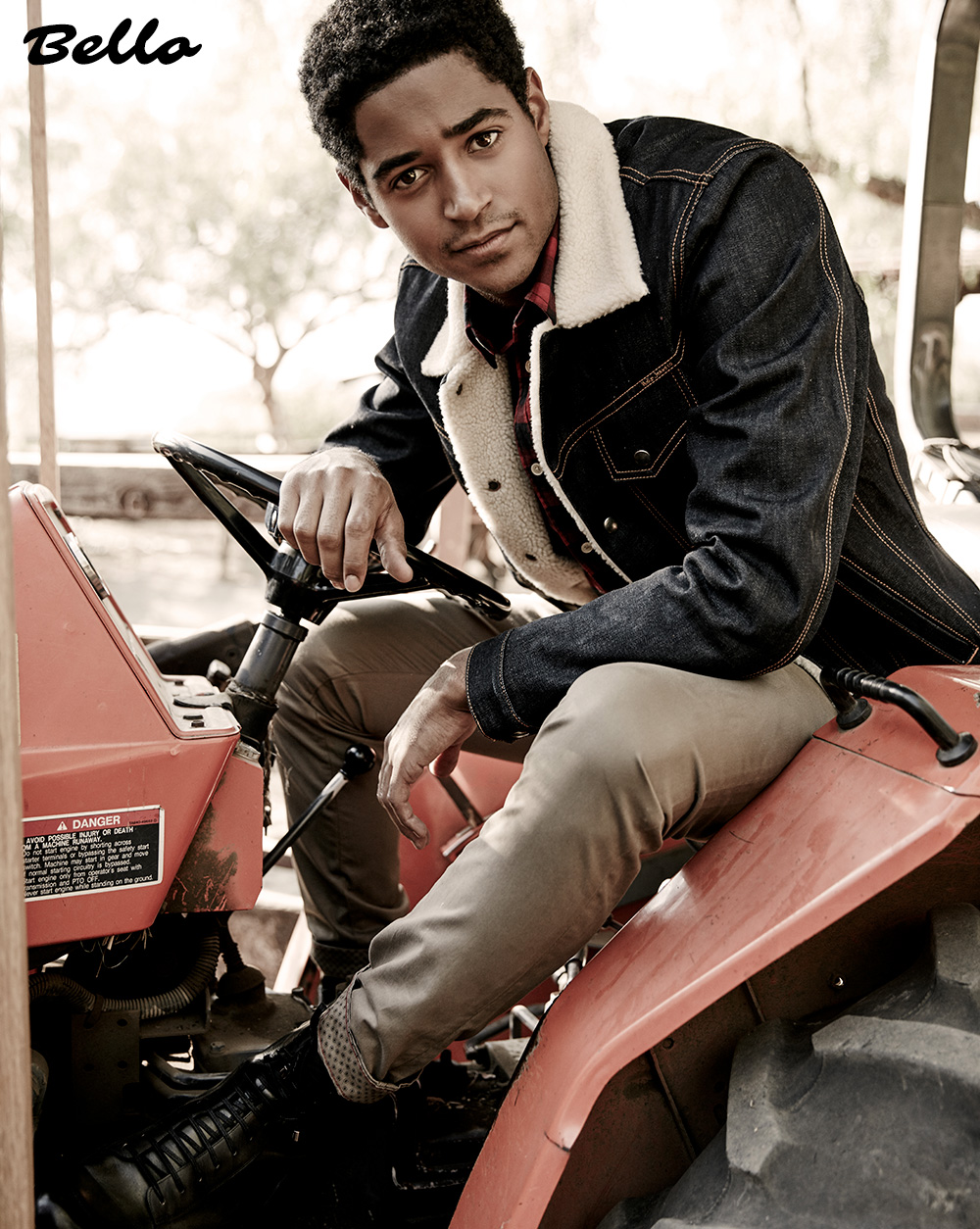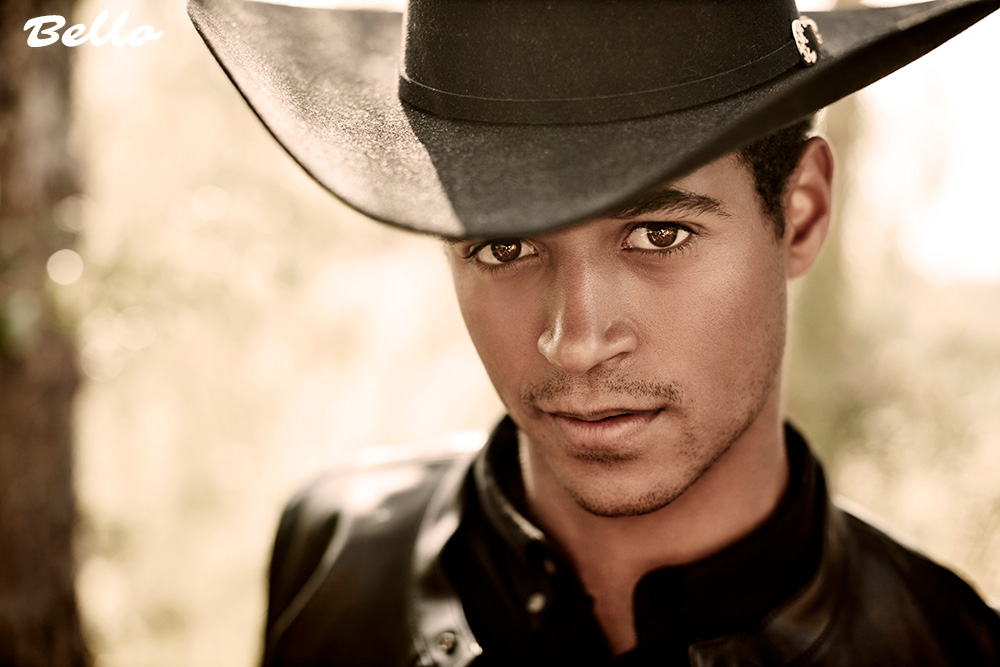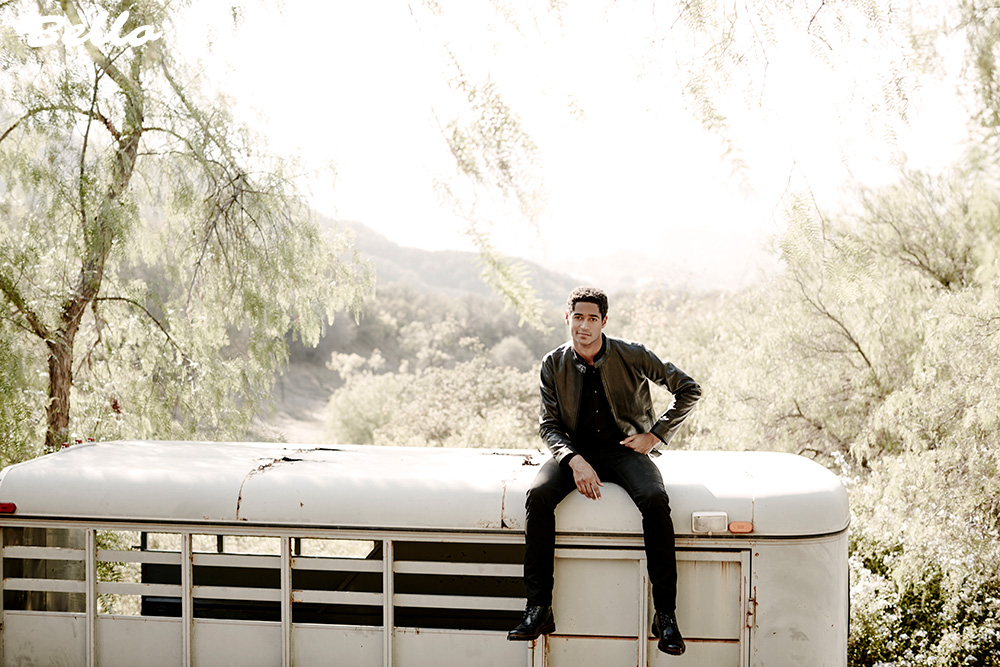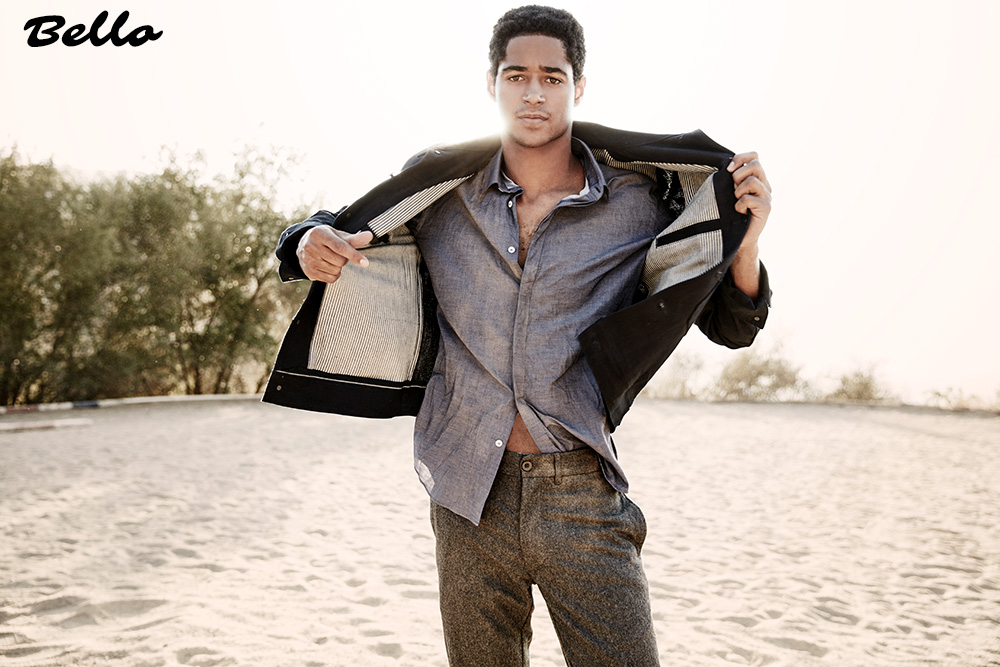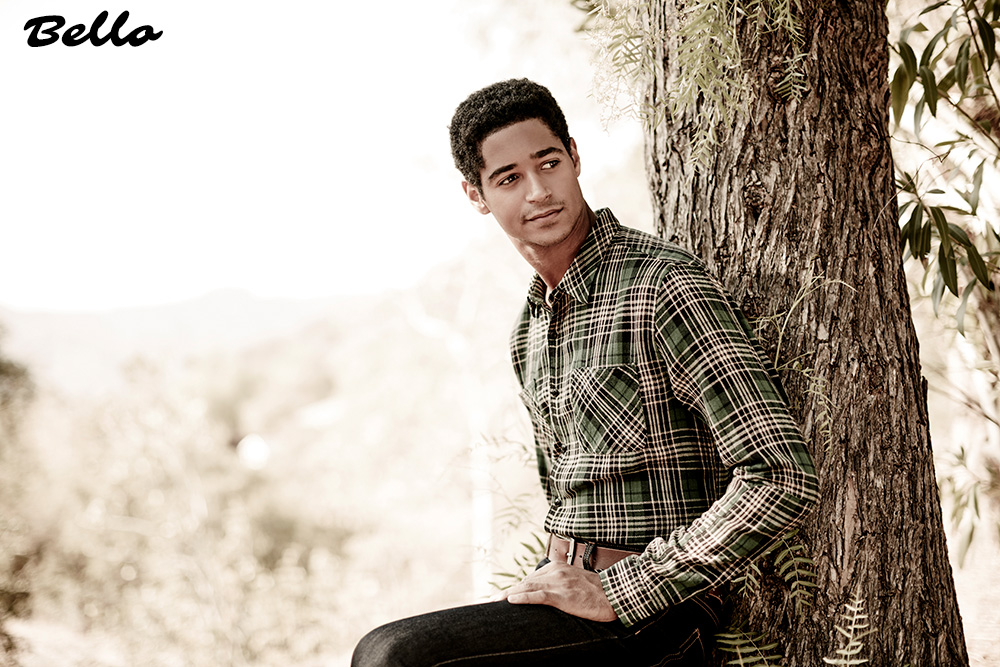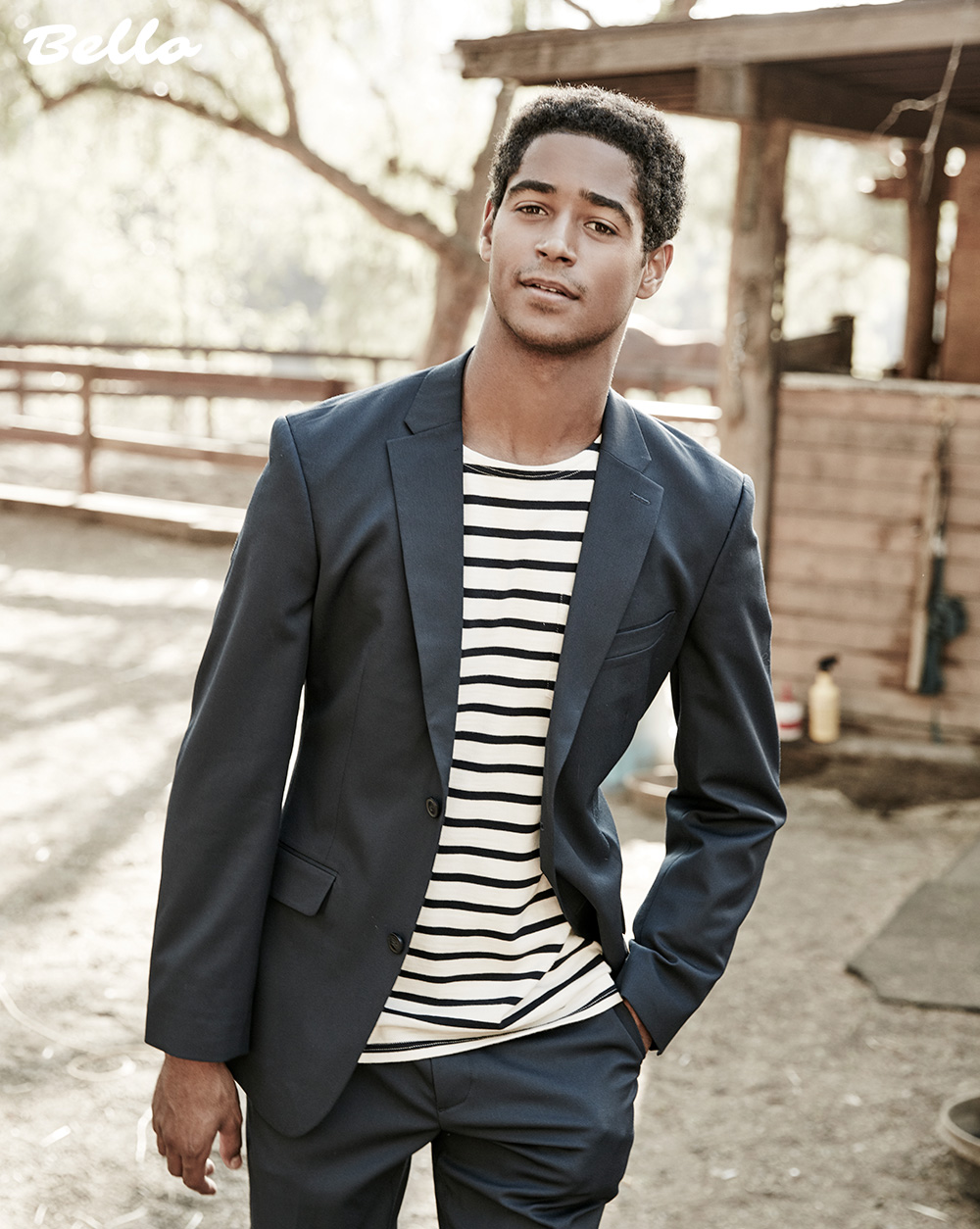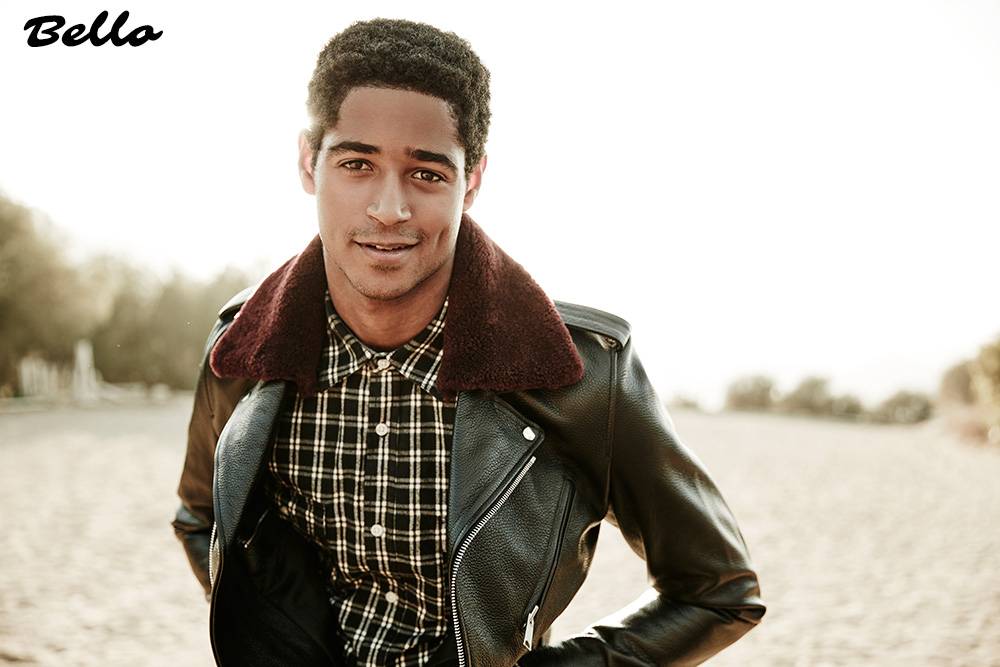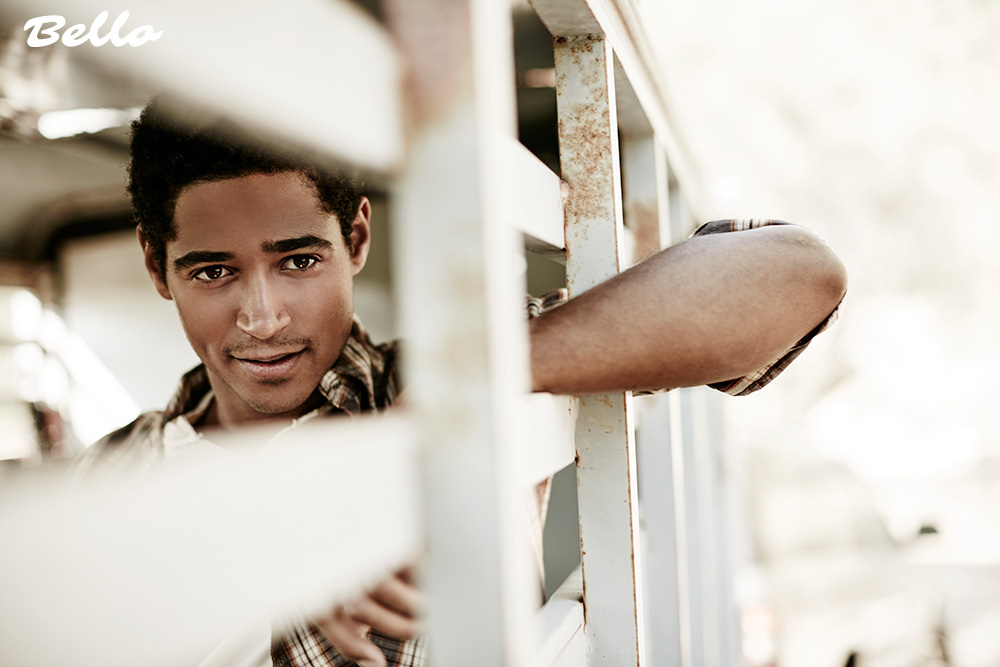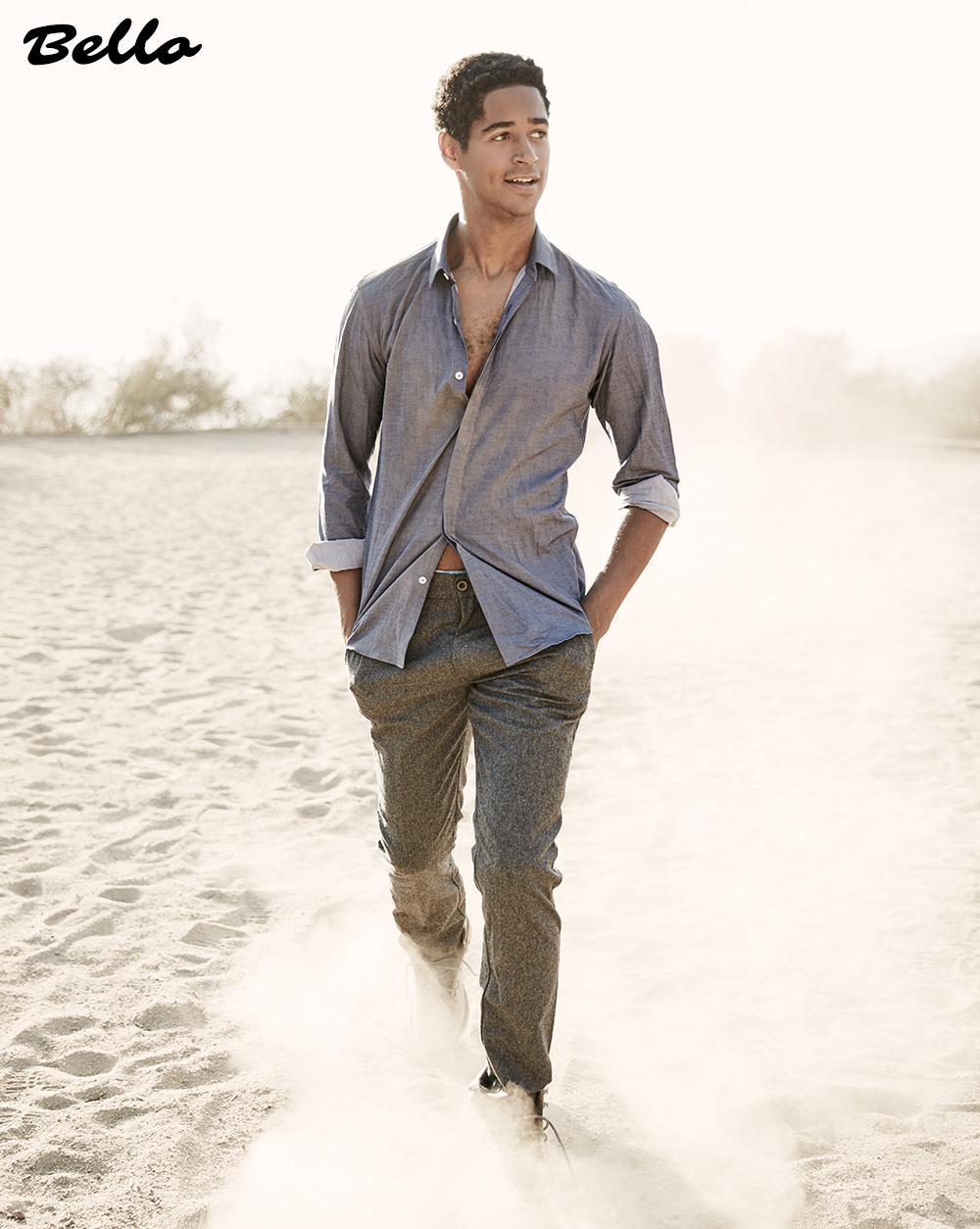Alfred Enoch
Teacher’s Pet
26-year old Alfred Enoch hit the Hollywood ground running the day his ABC series How To Get Away With Murder premiered on a breezy night in September. It was the 29th, the year was 2014, and his face was about to be engraved in everybody’s mind. For some, not literally, for others, probably so. He wouldn’t need the famous names of his co-star; Viola Davis, or Executive Producer, Shonda Rhimes, to remind people of his name or his performance in the ensuing 15 weeks the ABC series would air on Thursday nights. His performance and skill, like any great actor, would take care of that.
How to Get Away With Murder opened to over 14 million viewers, and its DVR ratings broke records shortly after the pilot’s airing. Sitting at home in Los Angeles, a Philly native myself, where the show is set, I was just one of the viewers who helped make such a soaring premiere night possible, and like every Murder fan, I anxiously awaited episode after episode, many times watching it live (in a time ruled by TiVO and iTunes season passes). Like the rest of America, I had an absolute relentless obsession with the steamy and oftentimes horrifying drama. It was another piece of gold straight out of Shondaland.
The finale of season one, which held no shortage of shock value, aired one day short of my 25th birthday. Being the die-hard fan that I was, I considered it nothing short of a gift. Something to watch and thoroughly enjoy before the already announced season two premiere, more than five months into the future.
When speaking to an actor, there is always that element of often times having to extract the right answer or the good answer. Speaking with Alfred was the exception, and there have been a few. It was a conversation so complete that I felt compelled to present this interview as unedited as possible, to truly convey his being as he did to me over the course of an hour over the phone on a Friday morning. Speaking to me completely outside of his native English accent, the recovering social media-ist, and my favorite face of the 2014 TV season revealed to me the secret behind his perfect american accent and what it truly is like being a part of the now infamous “Keating Five.” I invite you into my conversation with Alfred Enoch.
DA: You’re experience on the show and its ensuing success has been pretty interesting. How would you describe it all?
AE: It’s been really great for me, personally. Because, it’s a chance to be working with excellent people. The cast is great, across the board. I mean, to get to work with someone like Viola [Davis] which is a privilege. Naturally that’s what you want to be doing, you want to be exposing yourself to as many different people who work in different ways, and bring different things. But, also people whose work is really top notch, that’s how you learn. That’s the process of developing your work. So, it’s been really gratifying on a personal level. It’s also surprising because I remember when I just got the script I thought.. this would be great. But I thought it was very implausible. The likelihood of it just seemed minimal. I’d done Harry Potter, and mostly theater afterwards, with little bits of TV. I was just thinking, what’s the next play that’s going to come along. So, doing a TV show in the states, playing an american character would be a jump from that. And it was shown on US TV. I had never worked on the accent before, for all sorts of reasons, it seemed really implausible. It has turned itself into normality at this stage. By second theason, you acclimate, and it’s like sure, this really is what’s happening.
DA: Tell me what was your reaction when you found out who killed Lila Standgard?
AE: I was surprised, but the show is in the business of surprising you, right? That’s a big part of what I think makes it horrific and exciting to people. So yeah, it’s a surprising event because I think that it ties people that you wouldn’t think have much to do with that, to that offense. The writers, they sort of provide you with a lot of shock factor and a lot of twists. But from a viewer’s perspective, the interesting things about those twists is it’s not a resolution, it’s the beginning of a new set of questions. It’s like, why is he involved? What happened? why did that that come to be the state of affairs? I think that’s something that’s consistent over the course of the show. It’s a good way of surprising people. It’s a formal twist above the actual context twist. You’re asking people who did it? But this formal twist, this surprise is moving the goal post. It encourages a new set of questions. Because the question you’ve just been provided an answer for has just become obsolete.
DA: Kind of like you’ve been asking the wrong question all along?
AE: Exactly. Of course, you have to find that out to start asking the next questions. But, I think it’s dangled geniusly in a way that it’s like, you’re coming to the end of the road! It’s the moment of satisfaction! The end of the movie, the end of the book, where it’s all just put together. The explanation–finally. Then, Ah-ha! and we keep on going! Which makes it both satisfying and frustrating. You get to the crowning event and it blows everything wide open.
DA: I feel like you more than anyone in the cast gets to act opposite Viola on the show. You’re both great. What are those moments like for you? When you’re in the zone and the director yells action! The dynamics between both characters is so wild. What’s that like for you to explore as an actor?
AE :I can describe it as the most satisfying and great to play. That relationship is put under a lot of scrutiny by the writers I say, and there are always questions about it; and that’s always useful. The best thing about it I think is that it still maintains a level of ambiguity in the way that they’re [writers] writing it. Partly because a lot of the questions that are brought up during their interactions aren’t always resolved. What’s the nature of this relationship? Is there more to it than this pragmatism on her part? She has a student who finds out she’s having an affair and asks him to keep it secret. She’s just a pragmatic person. She has a problem and it needs fixing, so she solves it. It’s interesting to have something accidental at the genesis of it, and there isn’t a straightforward answer or explanation for the audience. It’s an interesting underburn. I think those kinds of questions and ambiguities leaves a lot to tap into. It’s in constant flux, which is the nature of the show itself. Everything happens really fast, there are a lot of events and people’s relationships change with each-other from week to week. In that particular relationship, with the time that it’s given, and not necessarily with the amount of scenes, but the ways the scenes are treated, it allows there to be a lot of weight between the two. Moving between those opposing parameters is what makes it really fun. Them being forced together and then being in conflict again. It’s fun shipping between those and still trying to incorporate the element that Annalise has still done things for Wes to be grateful of, for the audience to be grateful for and vice-versa.
DA: There’s definitely the whole aspect, so often during the show of “what’s going on here,” which is part of the reason It kept me coming back for more.
AE: The writers throw a lot into the pot, so there’s a lot to choose from and a lot to work with. It’s always nice having a scene that’s a two-hander. I really enjoyed the work I did with Katie [Findlay] last year as well. You’re in a scene that’s just you and someone else. It’s a different dynamic than a scene with the whole group, during the case of the episode for example. It’s faster, and the information’s coming out and we’ve got somewhere to get to. When you have two characters together and they’re trying to deal with something that’s more integral to them, that’s exciting stuff.
DA: There are so many actors whose accents oftentimes takes away from the reality of the show. That’s not the case with you. Has your American accent become second nature?
AE: Absolutely. It’s the advantage I guess of the way I decided to go about it. I’m very indebted to all the dialect coaches I have. Who worked with me and helped me specify and correct things and hone in on certain sounds.The first level is learning to make it muscular me. Genuinely, sounds are coming from different parts of your mouth, you’re learning to use your mouth in certain ways. Ultimately you’re correcting and changing something that you have a lifetime of experience in. It’s tricky. There was that element and sort of the beginning of that journey. The next thing is making that effortless, which I was very mindful of. I got to Philadelphia to do the pilot and I thought, it’s not good being able to do this accent, I needed to have it down. Not, yes I can say this line in an american accent, meanwhile thinking about that while I was saying the line during a scene. So, I decided to use it all the time, which is a bit of a weird thing to do. Even when I’m off set, I talk in the accent. Unless I’m doing press, and people are hearing my voice, I don’t want to trick people so I speak in what is my original accent. The irony is that I talk in my american accent for the majority of the year. I do the american more than I do my british. It helps, it means I’m not coming to set and thinking, oh I have to put this sound right at the back of my mouth, or I have to round my lips for this sound and make sure I get enough R.
DA: Is the obsession in the UK with the series as it is here in the US?
AE: In terms of the popularity of the show? It is, yeah! I was surprised. I’m not a pessimist, but I oblige myself to be for my own protection [laughs]. We did the pilot and everyone thought it was going to go, and there I was saying “hmm, it might not.” Desperately trying to remind myself of the possibility, just so I wouldnt be dissapointed. I had the same thoughts and expectations back in England. I didn’t know where and when it would air. It’s on abc at 10pm here, which is amazing. Primetime, a main network channel, people are bound to see it. Back in England, I had no idea. It’s aired on the Universal Channel here and I think it’s done great. They’ve done a good job at marketing it and presenting it to people. I think the other thing is that Shonda [Rhimes] has a fanbase. Sure, Pete [Nowalk] is the creator and the helmsman of our show, but Shonda has her input, it’s part of a family, and I think a lot of people tune into that brain. She’s done shows that have been incredibly successful and I think people want to see what comes out of the hat next I guess. Her appeal in that respect is international. Now I go home to England and people recognize me above everything for the show, which is nice.
DA: What’s life like outside the social media bubble? Because you have zero social accounts.
AE: Restful! That’s how I’d like to imagine it, certainly for me [laughs]. I’m easily distracted, so when I did use facebook for example, I’d find myself going on it, for what?Ii don’t know, to see what people were doing? Or reply to messages or something like that [laughs]. I never really learned to touch-type. I’m one of those people who calls people on the phone, rather than writing a three line text. I want to be talking to someone, I want to be hearing their voice; I just find it more personal. The other thing is, I’m just bad at technology. So, when I have to reply to an e-mail, I know it’s going to take me ten times as long as it would anybody else! Because I can’t just get it out. It gives you time to think about it, or rephrase. The same goes for text-messages. Partly for that reason it would take me ages to reply to someone. In that little window, since it was taking so long, I’d say, well, why not see what blah blah blah did on his holiday. I got so easily distracted. All of the sudden, two hours have passed and I’m looking at people I don’t even know, and I know all about their vacation [laughs].
I think it would be the same if I were on twitter or instagram. It would be a nightmare. I would never get anything done.
DA: I think that’s hilarious. However, you’re so lucky that you’re exempt from that, because it’s an incredibly easy hole to fall into.
AE: Do you use it? Do you like it?
DA: I do, but I’ve been in New York for the past three weeks and I’ve found that I’m on my phone even more, because I’m so curious as to what everyone in LA is doing, when I don’t really need to know such a thing. It’s very easy to take over.
AE :I know exactly what you mean. It’s the sense of possibility. If you couldn’t find out what people in LA were doing, you’d be fine, and you’d go around enjoying New York. Most of the time, it’s something you’d never miss. By having been acclimated to it, it’s different. But there’s no need to see what Bobby T is doing on his holiday in spain. It’s not vital, but you can, so you will check.
DA: Even in the sense of constantly looking up information on your phone that could surely wait till you’re at home.
AE: I used to love that space of not being able to look something up instantly. I resisted getting a smartphone. Everyone had one, but I didn’t want one. I had a Nokiah. It makes calls and sends texts, that’s all I need I thought. There was no question of replying now or later, or googling this or that.I just had to do it once I was back at home. But it’s become so expected. Everyone’s expecting a reply to an e-mail much quicker. You can’t just be like, well, I have an old phone, I’ll get back to you in two days because I’ll be out of town. You do that now, and someone will be flabbergasted. So in the end, you’re kind of just scooped along for the ride, like I have, in terms of getting a smart phone. It just encroaches on the more immediate way of spending time with people. Even without social media, I’m right there with everyone else on my phone, while sitting in a circle.
DA: At the end of the season, your character Wes is put on the spot and forced to deal with Rebecca over everyone else. Annalise tells him, this is your girlfriend, you deal with this. He goes through waves of keeping it together quite nicely, and also cracking at times. What would that have been like for you?
AE: I’d be a mess! He’s handled it really well! With all that’s happened in season one, it’s ridiculous. The writers are praised evil puppeteers. I’ve been thinking into this analogy a lot recently. They’re sitting across from each other in the writer’s room, with water bottles and coffees, having been up all night writing. I see them as something like a renaissance painting, having a nice time talking, and toying with the mortals downstairs [laughs]. That’s what it is really, they’re taking the lives of these characters and throwing them obstacle after obstacle and challenge after challenge. That’s what makes it exciting. It occurred to me as well as amused me because it’s very much like that. This authority, and classical God figure is setting tasks for Hercules to complete. Then you throw in the have the lions and so forth. It’s a good parallel I think.
Which makes it for a hard time for all the characters and Wes is right up there. During the first season, are you kidding? if that was me, I’d be in pieces. But the other side of it is, what choice did they have? They just have to keep going. Which is something I respect about Wes. He’s had so much thrown at him. Some of the others get to the point where they can’t continue. He’s fighting and has a resilience and a vitality which is deeply impressive. The night of the murder, he’s done it, and he has the most important person to him, to protect. The stakes are through the roof, so he’s got to find that application. It’s a question of preserving your freedom, getting away with what you did, in this case a murder. That’s the highest stake of all. I wouldn’t be nearly as impressive in the set of circumstances that he was exposed to. I would hope not to find myself around a woman whose job is to uphold the law but is subverting it all the time.I would be pretty compelled to stay away from that person. I’d do a better job than Wes in that respect.
DA: Come season two, you’ll be answering some questions, while also diving into a new mystery. What can you tell me about that?
AE: The first episode going back in we were all very much “what happens now”.I can tell you it’s good. It sets everything going again and it doesn’t really stop. There’s a lot there and a lot to keep people intrigued. For some characters we’ll see their backstory, and others, where we are now and how they’re dealing with what’s been put in front of them.
Photographer Maarten de Boer
Creative Direction Aleksandar Tomovic
Styling Darryl Glover at One Represents
Grooming Jessica Faraday
Nails Pilar Noire using Tweezerman
Location Malibu, CA
Production Bello Media Group | By Dio Anthony


